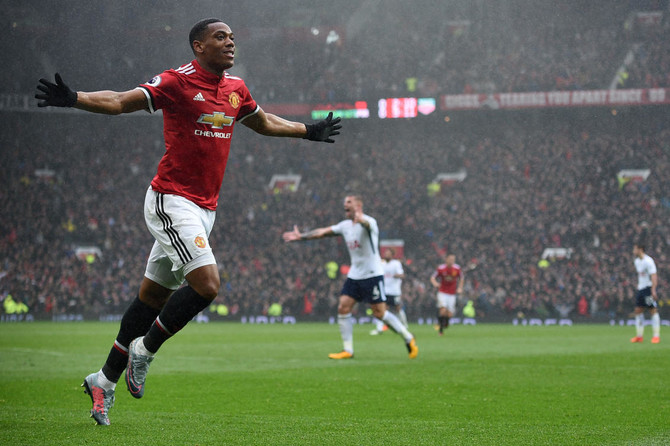MANCHESTER, UNITED KINGDOM: Manchester United manager Jose Mourinho was delighted by the commitment of his side after they bounced back from a shock defeat by Huddersfield Town with a 1-0 home win over Tottenham Hotspur on Saturday.
Substitute Antony Martial’s goal nine minutes from time was enough for United to go three points clear of Spurs in second place in the Premier League table.
Mourinho slammed United for a “really poor” attitude after the 2-1 defeat by Huddersfield but the Portuguese boss was far happier with what he saw against Spurs.
“We all feel we have to win every match so that’s why I felt disappointed at Huddersfield,” he told Sky Sports.
“It looked like we didn’t know that every point is a precious point. Today, every ball looked like the last ball of their careers.”
As for Martial, whose United future has been a source of speculation, Mourinho said: “Sometimes he starts the match and his contribution is good but he doesn’t score.
“I don’t understand some reactions when people question ‘are they Red Devils’? The two strikers were up against amazing central defenders, some of the best in Europe.”
There was nothing fancy about Martial’s winner, the forward finishing after a kick downfield by United goalkeeper David De Gea was headed on by Romelu Lukaku.
“Martial scores with a bad shot, but the bad shots can be the most beautiful,” said Mourinho. “To play well against a very, very good team feels even better.”
Former Chelsea manager Mourinho accepted the result could easily have gone the other way, saying: “That was difficult, it could have been a draw. Both teams were trying to win but both knew the opponent was strong.
“We knew if we had one defensive mistake we could lose and that’s what happened to them.
“We tried and we deserved the victory.”
Tottenham boss Mauricio Pochettino agreed with much of Mourinho’s assessment, saying: “It was an even game.
“It was a shame to lose. I think we deserved more. It was unlucky that in the last 10 minutes we conceded our goal. It was our mistake.”
Tottenham were without injured striker Harry Kane but Pochettino insisted his side’s title challenge was about more than the in-form England forward.
“If Dele Alli had scored now the question would be different,” Pochettino said. “It is always about the result. You are always going to miss your main striker but it is not fair to talk about Harry Kane.”
Mourinho hails players’ desire as Manchester United beat Tottenham Hotspur
Mourinho hails players’ desire as Manchester United beat Tottenham Hotspur

Merlier doubles up as Van der Poel denied epic win at Tour de France

- This was a second Tour win for Soudal Quick-Step sprinter Merlier this year, who was first across the line on stage three at Dunkirk
- After finishing in the peloton on Sunday, Pogacar was already looking ahead to Monday’s mountainous 165.3km slog
CHATEAU, France: Tim Merlier won stage nine of the Tour de France at Chateauroux on Sunday after a heroic long-range escape from Mathieu van der Poel was caught in the final kilometer.
There was no change atop the overall standings with Tadej Pogacar now holding a 54sec advantage over Remco Evenepoel in second with French starlet Kevin Vauquelin third.
This was a second Tour win for Soudal Quick-Step sprinter Merlier this year, who was first across the line on stage three at Dunkirk.
Merlier was led in by team leader Evenepoel.
“It’s mad, we are supposed to be helping him (Evenepoel) but he’s helping us,” Merlier said.
“I need to make it through the mountains now, I won’t be any use to Remco there, but I want to help him in the other ones,” said the 32-year-old.
On a sun drenched slog from the Chinon vineyards, Van der Poel and a teammate broke early and built up a lead of 5min 30sec on the flat roads to Chateauroux.
Jonas Rickaert won the combativity award for accompanying Van der Poel to within 10km of the line before slumping over his handlebars.
“I’m really happy. That was one of his (Rickaert) dreams, to win the combativity award and that’s why we went,” Van der Poel explained.
“In the end we nearly made it but we hadn’t expected to get that far,” he said of his 173km breakaway at an average speed on 49.9kph.
As with many heroic exploits, their epic escape was ultimately doomed to a gut wrenching narrow failure.
But with his gung-ho all-in style Van der Poel grew his Tour de France legend here despite being caught with 700m to go, the plaudits will be both his and Merlier’s.
“It’s hard to not be able to finish it off, but we put on a good show,” said the Dutch rider.
As Van der Poel was reeled in, it looked as though Jonathan Milan would win a second consecutive stage but Merlier got ahead with 30m remaining as Milan finished second with Arnaud De Lie completing the podium.
Road signs in honor of British cycling great Mark Cavendish had been placed at entry points to Chateauroux — reading Cavendish City — in homage to the now-retired 40-year-old, after he won three stages there in 2008, 2011 and 2021.
Pogacar’s Tour de France defense took a hit Sunday as his key teammate Joao Almeida threw in the towel two days after his nasty fall at the Mur de Bretagne, where he fractured a rib.
“It’s a big loss he was in good shape. He’s our hero. I was suffering today so I understand how he must have felt. Every respect to him,” the Slovenian said.
Stage 10 should shake up the race with eight classified climbs in the Massif Central on the July 14 French national holiday.
After finishing in the peloton on Sunday, Pogacar was already looking ahead to Monday’s mountainous 165.3km slog.
“Visma have a strong team for tomorrow and I think Jonas (Vingegaard) will be ready,” Pogacar said of his great Danish rival.
“There will be attacks from the main contenders, it’s up and down all day.
“I’m pretty confident in my team though. I’m looking forward to the hard stages,” added the 26-year-old three-time champion.
Pakistan assures UN chief of commitment to ensure peaceful resolution of conflicts

- UN Secretary General António Guterres calls Deputy PM Ishaq Dar, says Pakistan’s foreign office
- Pakistan is currently the president of the United Nations Security Council for the month of July
ISLAMABAD: Pakistan’s Deputy Prime Minister Ishaq Dar this week assured United Nations Secretary General António Guterres of Islamabad’s “strong commitment” to work for peaceful resolution to conflicts as president of the UN Security Council, the Pakistani foreign office said.
Pakistan assumed the presidency of the Security Council for July 2025 earlier this month. Islamabad has said it is mindful of the multiple challenges to international peace and security across the Middle East, South Asia, Africa, Europe, Latin America and other regions in today’s world.
Dar, who also serves as Pakistan’s foreign minister, received a telephone call from Guterres on Sunday night, Pakistan’s foreign ministry said in a statement.
“As Pakistan holds the Presidency of the UN Security Council for the month of July, the DPM/FM reaffirmed Pakistan’s strong commitment to international peace and security, and to the pacific settlement of disputes,” the foreign office said.
“He also highlighted the Signature Events being convened by Pakistan during its Presidency to advance these objectives.”
The statement said both leaders also looked forward to engaging in New York next week during activities related to Pakistan’s presidency of the UN Security Council.
“The DPM/FM further reiterated Pakistan’s continued support in facilitating the United Nations and its personnel in the effective discharge of their mandate,” the statement added.
Pakistan assumed the presidency of the UNSC at a critical time, with conflicts in the Middle East and Ukraine refusing to let up. Israel has killed over 57,000 Palestinians in Gaza since October 2023, in response to Hamas’ lightning attack. In June, it engaged in a conflict with Iran after attacking its nuclear facilities and military leadership.
Pakistan has repeatedly condemned Israel’s military actions against Palestine, Iran and other Middle Eastern countries since the 2023 conflict began. Islamabad has called for a peaceful resolution to the conflict and stated that lasting peace in the Middle East can only be achieved through the establishment of an independent Palestinian state, based on the pre-1967 borders with Al Quds Al Sharif as its capital.
South Korea medical students end 17-month class boycott

- South Korean health care was plunged into chaos early last year when then-president Yoon Suk Yeol moved to sharply increase medical school admissions
- The initiative met fierce protest, prompting junior doctors to walk away from hospitals and medical students to boycott their classrooms
SEOUL: Thousands of South Korean medical students are set to return to classrooms after a 17-month boycott, an industry body said Monday, ending part of a standoff which also saw junior doctors strike.
South Korean health care was plunged into chaos early last year when then-president Yoon Suk Yeol moved to sharply increase medical school admissions, citing an urgent need to boost doctor numbers to meet growing demand in a rapidly aging society.
The initiative met fierce protest, prompting junior doctors to walk away from hospitals and medical students to boycott their classrooms, with operations canceled and service provision disrupted nationwide.
The measure was later watered down, and the government eventually offered to scrap it in March 2025, after Yoon was impeached over his disastrous declaration of martial law.
“Students have agreed to return to school,” a spokesperson for the Korean Medical Association said Monday, adding that it was up to each medical school to decide the schedule for student returns.
The Korean Medical Students’ Association said in an earlier statement that the students had reached this decision because a continued boycott “could cause the collapse of the fundamentals of medical systems.”
Some 8,300 students are expected to return to school, but no specific timeline has been provided.
Prime Minister Kim Min-seok welcomed the decision, calling it a “big step forward” in a Facebook post Sunday, adding President Lee Jae Myung was deliberating ways to solve the issue.
In addition to the student boycott, some 12,000 junior doctors went on strike last year – with the vast majority of them still declining to return to work.
Lee – who took office in June after winning snap elections following Yoon’s removal from office – had said on the campaign trail he would seek to resolve the medical strike.
The increase in medical school admissions led to a record number of students re-taking the college entrance exam in November in a bid to capitalize on reforms that made it easier to get into coveted majors.
Pakistan requests Saudi Arabia to increase Hajj pilgrims’ quota to 230,000

- Pakistan received a quota of 179,210 pilgrims from Saudi Arabia for Hajj 2025, split evenly between government and private schemes
- Saudi authorities working on digitizing Hajj management system to ensure easier, more efficient services, says religious affairs minister
ISLAMABAD: Islamabad has formally requested Saudi Arabia to increase its Hajj pilgrims’ quota to 230,000, Pakistan’s Minister for Religious Affairs Sardar Muhammad Yousaf said this week, according to state-run media, as the country hopes more people can perform the annual Islamic pilgrimage.
Pakistan received a quota of 179,210 pilgrims from Saudi Arabia for Hajj 2025, evenly divided between the government and private Hajj operators. For this year’s pilgrimage, Islamabad has already concluded the registration process, with state media reporting that the country has received over 450,000 Hajj applications in total.
“He [Yousaf] noted that Pakistan has formally requested the Saudi government to increase the Hajj quota to 230,000, in proportion to the country’s population to allow more people to undertake the pilgrimage,” the state-run Pakistan Television News reported on Sunday.
The minister was on a visit to Darul Uloom Mansehra where he attended a reception in his honor. Yousaf said the increase in the number of people registering for Hajj 2026, over 450,000, reflects that the trust of the public has been restored in Pakistan’s religious affairs ministry.
“Furthermore, the minister said that the Saudi authorities are working on digitizing the Hajj management system, which will ensure easier and more efficient services for pilgrims in the future,” PTV News reported.
A major portion of the private quota for Hajj pilgrims for 2025 remained unutilized due to delays by companies in meeting payment and registration deadlines, while the government filled its full allocation of over 88,000 pilgrims.
Private operators blamed the situation on technical glitches such as payment issues and communication breakdowns.
Hong Kong court hears appeals by jailed democracy campaigners

- They are among 45 opposition figures, including some of Hong Kong’s best-known democracy activists, who were sentenced in November
- Authorities arrested figures from a broad cross-section of the city’s opposition in morning raids in 2021, a group later dubbed the ‘Hong Kong 47’
HONG KONG: A Hong Kong court began hearing appeals on Monday from 12 democracy campaigners who were jailed for subversion last year during the city’s largest national security trial.
They were among 45 opposition figures, including some of Hong Kong’s best-known democracy activists, who were sentenced in November over a 2020 informal primary election that authorities deemed a subversive plot.
Critics including the United States, Britain and the European Union said the case showed how a Beijing-imposed national security law has eroded freedoms and quashed peaceful opposition in Hong Kong.
Ex-lawmakers “Long Hair” Leung Kwok-hung, Lam Cheuk-ting, Helena Wong and Raymond Chan are among those contesting their convictions and sentences in hearings that are scheduled to last 10 days.
Owen Chow, a 28-year-old activist who was sentenced to seven years and nine months in jail – the harshest penalty among the dozen – has also lodged an appeal.
Former district councilor Michael Pang withdrew his appeal application on Monday morning, leaving a total of 12 appellants.
Some of them have already spent more than four years behind bars.
Amnesty International’s China director Sarah Brooks said the appeal will be a “pivotal test” for free expression in the Chinese finance hub.
“Only by overturning these convictions can Hong Kong’s courts begin to restore the city’s global standing as a place where rights are respected and where people are allowed to peacefully express their views without fear of arrest,” Brooks said.
Dozens of police officers were deployed outside the West Kowloon court building on Monday morning as people queued to attend the hearing.
“They made a sacrifice... I hope they understand that Hongkongers have not forgotten them,” said a public hospital worker in his thirties surnamed Chow.
A 66-year-old retiree surnamed Chan said the case made him feel “helpless,” adding that fewer people were paying attention as court proceedings dragged on.
“I don’t expect any (positive) outcome, but I still want to support them.”
Prosecutors began Monday’s session by challenging the acquittal of lawyer Lawrence Lau, one of two people found not guilty in May 2024 from an original group of 47 accused.
Lau’s “overall conduct” showed that he was party to the conspiracy and he should be tried again because the lower court made the wrong factual finding, the prosecution argued.
Lau, representing himself, replied that the trial court’s findings should not be “casually interfered” with.
“… I have never advocated for the resignation of the chief executive, I have never advocated the indiscriminate vetoing of the financial budget,” Lau told the court, referring to core tenets of the alleged conspiracy.
Beijing has remolded Hong Kong in its authoritarian image after imposing a sweeping national security law in 2020 following months of huge, and sometimes violent, pro-democracy demonstrations.
Authorities arrested figures from a broad cross-section of the city’s opposition in morning raids in 2021, a group later dubbed the “Hong Kong 47.”
The group, aged between 27 and 69, included democratically elected lawmakers and district councilors, as well as unionists, academics and others with political stances ranging from modest reformists to radical localists.
They were accused of organizing or taking part in an unofficial primary election, which aimed to improve the chances of pro-democracy parties of winning a majority in the legislature.
The activists had hoped to force the government to accede to demands such as universal suffrage by threatening to indiscriminately veto the budget.
Three senior judges handpicked by the government to try security cases said the plan would have caused a “constitutional crisis.”

















